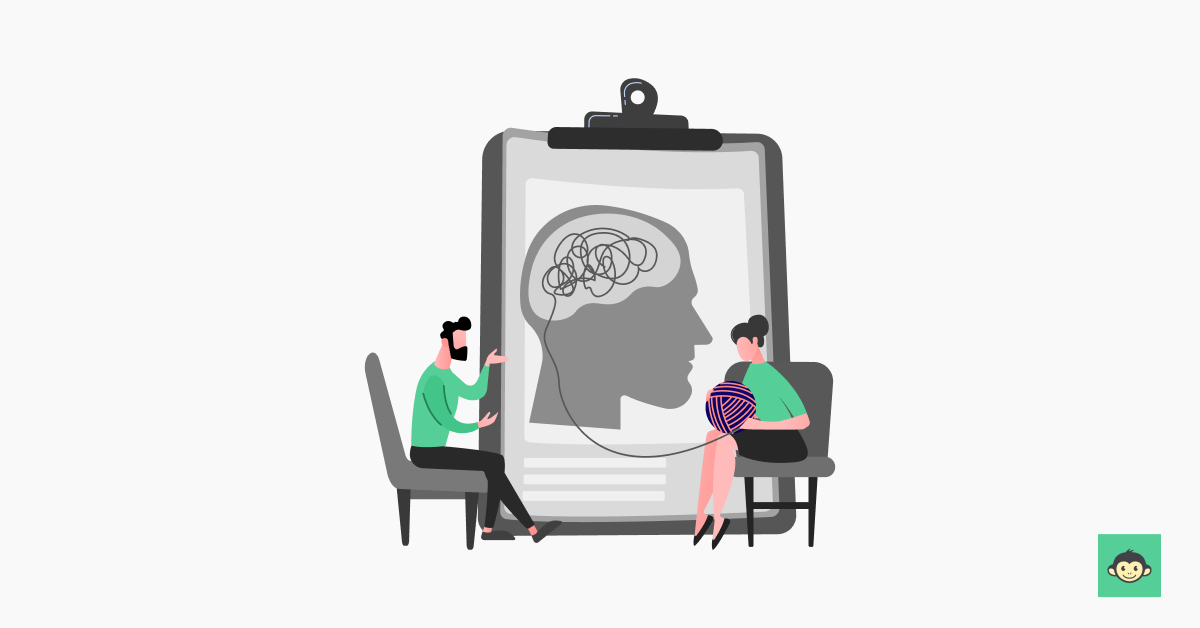Employee counseling: Definition, best practices and top examples for leaders in 2024

Employee well-being is no longer a secondary company concern—it's a top priority. Employee counseling, also known as workplace counseling or mental health support, is a powerful tool for fostering a positive and productive work environment.
By offering employee assistance programs (EAPs) and confidential counseling sessions, companies can empower their workforce to address personal issues, manage stress, and achieve a healthy work-life balance.
This blog post dives deep into the world of employee counseling, providing valuable insights for leaders in 2024. We'll explore the definition of employee counseling, delve into best practices for implementation, and provide real-world examples to help you get started.
Whether you're looking to improve employee performance, reduce employee stress, or simply show your employees you care, this guide will equip you with the knowledge you need to create a thriving workplace culture.
So, if you're ready to unlock the full potential of your team and create a supportive environment where employees can flourish, keep reading!
Employee counseling definition

Employee counseling is a supportive process designed to address various challenges and promote well-being among employees within an organization. It encompasses a range of services aimed at assisting employees in managing personal and work-related issues that may affect their mental health, job performance, and overall quality of life.
At its core, employee counseling involves providing guidance, support, and resources to help individuals navigate through difficult situations and develop effective coping mechanisms.
This may include addressing issues such as stress, anxiety, burnout, substance abuse, family conflicts, and other personal problems that could impact their work performance and productivity.
Why is counseling an employee important?

Employee counseling is important for several reasons:
- Promoting employee mental health: Counseling provides employees with a supportive environment to address mental health issues such as stress, anxiety, and depression. By offering counseling services, organizations demonstrate a commitment to prioritizing the well-being of their employees.
- Improving job performance: When employees receive support to manage personal and work-related challenges, they are better equipped to perform their job duties effectively. Counseling can help individuals develop coping strategies, enhance resilience, and improve their ability to manage stressors in the workplace.
- Reducing employee stress: Workplace stress can have detrimental effects on both the individual and the organization, leading to decreased productivity, increased absenteeism, and higher turnover rates. Counseling offers employees tools and techniques to cope and deal with stress, thereby reducing its negative impact on their health and performance.
- Enhancing work-life balance: Counseling can assist employees in achieving a healthier balance between their work responsibilities and personal life. By addressing issues such as time management, boundary-setting, and prioritization, counseling helps individuals create a more sustainable and fulfilling lifestyle.
- Preventing burnout: Counseling interventions can help identify early signs of burnout and provide employees with strategies to prevent its onset. By addressing underlying stressors and promoting self-care practices, counseling helps individuals maintain their well-being and avoid burnout-related exhaustion and disillusionment.
- Supporting personal growth: Counseling offers individuals the opportunity for self-reflection, growth, and development. Through the guidance of a trained counselor, employees can explore their strengths, weaknesses, and goals, ultimately leading to greater self-awareness and personal fulfillment.
- Fostering a positive work environment: When employees feel supported and valued, they are more likely to be engaged, motivated, and satisfied with their work. Counseling initiatives contribute to a positive workplace culture where employees feel comfortable seeking help and openly discussing their concerns.
- Addressing workforce diversity and inclusion: Counseling programs can be tailored to address the unique needs and challenges faced by employees from diverse backgrounds. By offering culturally competent counseling services, organizations demonstrate inclusivity and support for all members of their workforce.
Types of employee counseling

Types of employee counseling can vary based on the specific needs and challenges of individuals within an organization. Some common types include:
- Personal counseling: This type of counseling service focuses on addressing personal issues such as stress, anxiety, depression, family conflicts, and substance abuse that may affect an employee's well-being and job performance.
- Workplace counseling: Workplace counseling addresses job-related challenges such as work-related stress, conflicts with colleagues or supervisors, job dissatisfaction, and career development.
- Directive counseling: In directive counseling, counselors provide specific guidance and advice to help employees address immediate issues and develop action plans to improve their situation.
- Non-directive counseling: Non-directive counseling emphasizes listening and facilitating self-discovery, allowing employees to explore their thoughts, feelings, and solutions at their own pace with the support of the counselor.
- Participative counseling: Participative counseling involves employees actively participating in decision-making processes regarding their treatment plans, goals, and strategies for improvement.
- Short-term counseling: Short-term counseling focuses on addressing immediate concerns and providing brief interventions to help employees manage their issues effectively within a limited timeframe.
- Employee Assistance Program (EAP) services: EAP services offer a range of counseling and support services to employees and their family members, covering various issues such as mental health, substance abuse, financial problems, and legal concerns.
- Appointed counselor programs: In these programs, designated individuals within the organization serve as points of contact for employees seeking counseling support, providing a confidential and accessible resource for assistance.
- Clinical counseling: Clinical counseling involves working with licensed mental health professionals, such as psychologists or therapists, who are trained to diagnose and treat a wide range of mental health conditions.
- Voluntary counseling: Voluntary counseling programs allow employees to access counseling services voluntarily, without any coercion or pressure from the employer or organization, ensuring that individuals feel comfortable seeking help on their terms.
10 Employee counseling benefits that you should know in 2024

Employee counseling offers numerous benefits for both employees and organizations:
- Promotes mental health: Counseling provides employees with the support and resources to address mental health concerns such as stress, anxiety, and depression, promoting overall well-being.
- Enhances job performance: By addressing personal and work-related challenges, counseling helps employees develop coping strategies and resilience, leading to improved job performance and productivity.
- Reduces employee stress: Counseling equips employees with tools and techniques to manage stress effectively, reducing absenteeism, turnover, and the negative impact of stress on health and performance.
- Improves work-life balance: Counseling assists employees in achieving a healthier balance between work responsibilities and personal life, contributing to greater satisfaction and fulfillment in both domains.
- Prevents burnout: Counseling interventions help identify and address early signs of burnout, enabling employees to maintain their well-being and avoid exhaustion and disillusionment.
- Supports personal growth: Counseling provides individuals with opportunities for self-reflection, growth, and development, leading to greater self-awareness and fulfillment in both personal and professional spheres.
- Fosters a positive work environment: Counseling initiatives contribute to a supportive workplace culture where employees feel valued, supported, and empowered to seek help when needed.
- Enhances employee engagement: When employees feel supported and cared for, they are more likely to be engaged, motivated, and committed to their work and the organization.
- Addresses workforce diversity and inclusion: Counseling programs can be tailored to meet the unique needs of employees from diverse backgrounds, fostering inclusivity and support for all members of the workforce.
- Reduces costs for organizations: By promoting employee well-being and performance, counseling helps organizations reduce costs associated with absenteeism, turnover, decreased productivity, and healthcare expenses.
How is employee counseling linked to employee engagement?
Employee counseling is closely linked to employee engagement in several ways:
- Opportunity for growth: Counseling provides employees with chances for personal development. By addressing challenges and enhancing coping skills, counseling empowers employees to achieve their full potential, leading to increased engagement in their work.
- Improved work relationships: Counseling helps employees address interpersonal conflicts and improve communication skills, leading to stronger relationships with colleagues and supervisors, which contribute to higher levels of engagement and job satisfaction.
- Stress management: Counseling equips employees with tools to manage stress effectively. When supported in handling work-related stressors, employees are less likely to experience burnout and disengagement.
- Reduced turnover: Counseling can help employers prevent burnout and address issues that may lead employees to consider leaving their jobs. By retaining talent and reducing turnover, organizations can maintain higher levels of employee engagement.
How do you counsel an employee the right way?

Counseling an employee effectively involves several key steps to ensure that they receive the support and guidance they need in a respectful and constructive manner:
Establish trust and confidentiality
Begin by creating a safe and confidential environment where the employee feels comfortable sharing their concerns without fear of judgment or repercussions. Assure them that the information discussed will remain confidential unless there is a risk of harm to themselves or others.
Active listening
Listen attentively to the employee's concerns without interrupting or making assumptions. Use empathetic listening techniques to understand their perspective and validate their feelings. Reflect back what they've said to demonstrate understanding and empathy.
Clarify concerns and goals
Encourage the employee to articulate their concerns clearly and identify their goals for counseling. Help them prioritize their issues and focus on what they want to achieve through the counseling process.
Provide support and empathy
Offer emotional support and empathy to the struggling employee as they navigate their challenges. Acknowledge their feelings and validate their experiences, demonstrating that you understand and care about their well-being.
Offer guidance and resources
Provide guidance and practical advice to help the employee address their concerns and achieve their goals. Offer resources such as self-help materials, workshops, or referrals to external support services if needed.
Explore solutions collaboratively
Collaborate with the employee to explore potential solutions to their challenges. Encourage them to brainstorm ideas and consider different approaches, offering support and guidance as needed.
Empower decision-making
Empower the employee to make informed decisions about their situation. Offer options and alternatives, but ultimately respect their autonomy and support their choices.
Set SMART goals
Help the employee set specific, measurable, achievable, relevant, and time-bound (SMART) goals to track their progress and stay motivated. Break larger goals into smaller, actionable steps to make them more manageable.
Follow-up and monitor progress
Schedule follow-up sessions to check in on the employee's progress and provide ongoing support and guidance. Monitor their goals and celebrate achievements, while also addressing any setbacks or challenges that arise.
Maintain confidentiality and boundaries
Respect confidentiality and maintain professional boundaries throughout the counseling process. Avoid sharing sensitive information with others unless necessary for the employee's well-being or safety.
Tips and best practices for effective employee counseling

Here, we present key tips and best practices aimed at empowering counselors to guide employees towards personal and professional growth while nurturing a culture of openness, trust, and engagement.
- Empower employee engagement: Encourage active participation from employees during counseling sessions to foster engagement and ownership of their emotional well being-being.
- Utilize non-directive approaches: Incorporate non-directive counseling techniques to empower employees to explore their thoughts and feelings freely, facilitating self-discovery and problem-solving.
- Promote work-life balance: Address work-life balance issues during counseling sessions to help employees manage competing demands effectively and improve overall well-being.
- Facilitate open communication: Create a safe and supportive office environment where employees feel comfortable expressing their concerns and discussing sensitive topics openly.
- Offer personalized support: Tailor counseling sessions to address the unique needs and circumstances of each employee, ensuring that interventions are relevant and effective.
- Provide resources and referrals: Offer information about additional support services, such as EAPs or external counseling resources, to supplement counseling sessions and provide comprehensive support.
- Address stress and burnout: Equip employees with stress management techniques and coping strategies to mitigate the negative effects of workplace stress and prevent burnout.
- Focus on goal setting and progress monitoring: Collaborate with employees to set specific and achievable goals for personal and professional development, and regularly review progress to maintain motivation and accountability.
- Ensure confidentiality and trust: Respect confidentiality and build trust with employees by maintaining strict confidentiality standards and demonstrating empathy, respect, and non-judgmental attitudes.
- Encourage follow-up and support: Schedule follow-up sessions to monitor progress, provide ongoing support, and adjust counseling strategies as needed to address evolving needs and challenges.
What are employee counseling programs?

Employee counseling programs are structured initiatives designed to provide support, guidance, and assistance to employees facing personal or work-related challenges. These programs typically offer confidential counseling services delivered by trained professionals, such as counselors, psychologists, or therapists.
Employee counseling programs aim to address a wide range of issues, including stress, anxiety, depression, work-life balance, interpersonal conflicts, career concerns, and more.
These programs may be offered internally by the organization, through EAPs or outsourced to external providers. Counseling sessions may be conducted one-on-one or in group settings, depending on the nature of the issues and the preferences of the employees involved.
The goal of employee counseling programs is to promote employee well-being, resilience, and performance, ultimately contributing to a healthier and more productive workforce.
5 Employee counseling examples to get inspiration from

- Individual counseling sessions: One-on-one counseling sessions conducted between an employee and a trained counselor to address specific personal or work-related challenges. These sessions focus on providing personalized support, guidance, and strategies to help the employee overcome obstacles and achieve their goals.
- Group counseling workshops: Group counseling workshops conducted with small groups of employees to explore common challenges, such as stress management, communication skills, or work-life balance. These workshops offer a supportive environment for employees to share experiences, learn from each other, and develop practical strategies for coping and thriving in the workplace.
- Employee Assistance Program (EAP) services: Access to confidential counseling services provided through an EAP, which may include telephone counseling, online resources, or referrals to external counselors or therapists. EAPs offer employees a convenient and confidential way to seek support for a wide range of personal and work-related issues, such as mental health concerns, financial stress, or substance abuse.
- Managerial coaching and mentoring: Counseling and coaching sessions provided by managers or mentors to support the professional development and well-being of their team members. These sessions may focus on career planning, performance improvement, leadership skills, or work-related challenges, and aim to empower employees to reach their full potential and excel in their roles.
- Peer support groups: Informal counseling and support groups facilitated by peers within the organization to address common challenges or promote mental health and well-being. Peer support groups provide employees with a sense of community, understanding, and solidarity, allowing them to share experiences, offer advice, and provide emotional support to one another.
Conclusion
Employee counseling is a crucial practice for supporting workforce well-being and productivity in 2024. By implementing best practices and learning from top examples, leaders can effectively address employee concerns and foster a positive work environment.
CultureMonkey's employee engagement survey platform is the ideal tool for this, offering real-time insights and anonymous feedback to help organizations understand employee needs better.
This enables leaders to identify issues early and tailor their counseling efforts to address specific challenges. Utilizing CultureMonkey empowers organizations to implement data-driven strategies that boost overall employee satisfaction and engagement.



